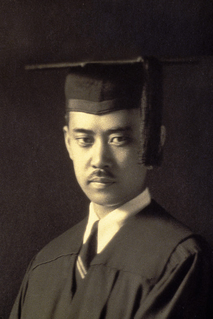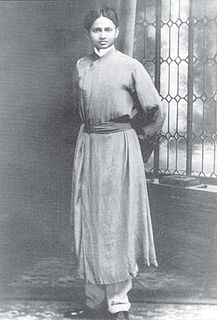A Quote by Aristotle
If thinking is like perceiving, it must be either a process in which the soul is acted upon by what is capable of being thought, or a process different from but analogous to that. The thinking part of the soul must therefore be, while impassable, capable of receiving the form of an object; that is, must be potentially identical in character with its object without being the object. Mind must be related to what is thinkable, as sense is to what is sensible.
Related Quotes
Objects must cease, mind must become just a pure mirror - a mirroring, not mirroring anything - just a mirror without any object in it, a pure mirror. By dhyan, this purity of the mind is indicated. So first, no object should be in the mind. Mind must remain alone without thinking about anything - with no thought, just a consciousness, just an awareness, just an alertness. This alertness without any object is meditation.
The soul is the form of the body, but not as the shape of a statue is formatio et terminatio materiae, for form does not exist apart from material. There is no whiteness without a white object. But the soul is not a form in this simple sense, and in particular, is not the shape of the material it informs. Therefore, the shape of a being does not affect the being's soul, for then something lower would inform something higher, which is impossible.
I've always seen process of crafting as part of the thinking process. It really forms the gestation of the work. I'll get an idea; I want to express this idea, sometimes I'll start it, but during the process of making the object - if it's an object or a painting - it changes. It never goes in a linear progression from A to Zed. It's always this kind of circuitous, stumbling, groping in the dark kind of process of evolving.
You must be respectful and assenting, but without being servile and abject. You must be frank, but without indiscretion, and close, without being costive. You must keep up dignity of character, without the least pride of birth, or rank. You must be gay, within all the bounds of decency and respect; and grave, without the affectation of wisdom, which does not become the age of twenty. You must be essentially secret, without being dark and mysterious. You must be firm, and even bold, but with great seeming modesty.
The object of a dialogical-liberterian action is not to 'dislodge' the oppressed from a mythological reality in order to 'bind' them to another reality. On the contrary, the object of dialogical action is to make it possible for the oppressed, by perceiving their adhesion, to opt to transform an unjust reality." "In order for the oppressed to unite they must first cut the umbilical cord of magic and myth which binds them to the world of oppression; the unity which links them to each other must be of a different nature.
And so it is with our own past. It is a labour in vain to attempt to recapture it: all the efforts of our intellect must prove futile. The past is hidden somewhere outside the realm, beyond the reach of intellect, in some material object (in the sensation which that material object will give us) of which we have no inkling. And it depends on chance whether or not we come upon this object before we ourselves must die.
There must be a union between the spirit in wood and the spirit in man. The grain of the wood must relate closely to its function. The abutment of the edge of one board to an adjoining board can mean the success or failure of a piece. () Gradually a form evolves, much as nature produces the tree in the first place. The object created can live forever. The tree lives on in its new form. The object cannot follow a transitory “style”, here for a moment, discarded the next. Its appeal must be universal. Cordial and receptive, it should invite a meeting with man
The meaning of self-esteem is to feel lovable and capable. As parents, we must love our children unconditionally and give them a sense of being nurtured. That's the lovable part. Then, we must provide structure - rules, boundaries, daily or weekly household tasks that give them a sense they are making a contribution. That's what helps kids grow up feeling capable.
There are two distinctive peculiarities by reference to which we characterize the soul (1) local movement and (2) thinking, discriminating, and perceiving. Thinking both speculative and practical is regarded as akin to a form of perceiving; for in the one as well as the other the soul discriminates and is cognizant of something which is.
Our minds must meditate on some object. According to what he thinks, a man can create an atmosphere of radiance, exuberance, buoyancy; and this brings joy. Or he can carry gloom with him. It is a matter of the habit of thought. We must build up our own life by our thoughts. There are many ways by which we can do this. Art, music, even manual work, all can bring ripening to the soul.
In every remodelling of the present, the existing condition of things must be supplanted by a new one. Now every variety of circumstances in which men find themselves, every object which surrounds them, communicates a definite form and impress to their internal nature. This form is not such that it can change and adapt itself to any other a man may choose to receive; and the end is foiled, while the power is destroyed, when we attempt to impose upon that which is already stamped in the soul a form which disagrees with it.
The Anti-Vivisector does not deny that physiologists must make experiments and even take chances with new methods. He says that they must not seek knowledge by criminal methods, just as they must not make money by criminal methods. He does not object to Galileo dropping cannon balls from the top of the leaning tower of Pisa; but he would object to shoving off two dogs or American tourists.









































